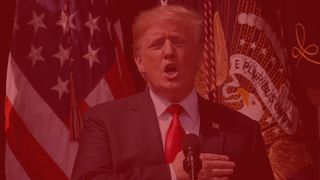After Donald Trump was inaugurated, Washington speculated: Might we see from Bob Woodward, given the volcanic eruption of power and chaos that engulfed Trump from the moment he took the oath of office, the bookend to All The President's Men, his legendary collaboration with Carl Bernstein, both of The Washington Post, on the crimes and fall of Richard Nixon? That book re-defined the crafting of contemporaneous presidential histories. Fear is an even deeper forensic accumulation and sifting of events, facts, documents, records, interviews, all ultimately emerging as settled fact. Woodward has said, "The building blocks of journalism, of truth, are specific incidents". And that is what we have in stellar form in Fear.
Fear is a bunker-buster: a massive smart bomb that burrows under 1600 Pennsylvania Avenue and blows open this White House's foundations, shaking its occupants to their core.
Where Michael Wolff set off an IED with Fire and Fury – a book-length magazine article of racy anecdotes that scarred everyone with its shrapnel – Fear is a bunker-buster: a massive smart bomb that burrows under 1600 Pennsylvania Avenue and blows open this White House's foundations, shaking its occupants to their core.
The breaking news from the publication of Fear has been the tales of the most senior Trump aides stealing documents from his desk in order to prevent catastrophic consequences from Trump's horrific infirmities: lack of knowledge of not only history, but contempt for the norms that make the American political system work. To stop Trump from signing a letter terminating the South Korea free trade agreement – a disaster when unity was needed to face the North Korean nuclear threat – they swiped it, counting on Trump's short-term attention span to forget about it. Woodward has the letter. On trade, Trump scribbled his distilled thinking on his speech notes: "TRADE IS BAD". Woodward has the scribble.
Woodward's big reveals about Trump's character are relentless. The essence of Trump's world view: "protectionism, isolationism and fervent American nationalism." Trump wants to withdraw from Iraq, Afghanistan, Syria, South Korea, all trade deals, the Paris climate accords, the Iran nuclear agreement
Woodward's big reveals about Trump's character are relentless. The essence of Trump's world view: "protectionism, isolationism and fervent American nationalism." Trump wants to withdraw from Iraq, Afghanistan, Syria, South Korea, all trade deals, the Paris climate accords, the Iran nuclear agreement. There are vicious internal wars on trade, immigration, the Middle East, China, North Korea. Yes, Secretary of State Rex Tillerson calls Trump a moron. Yes, Chief of Staff John Kelly calls Trump an idiot. Both with expletives. "The president has zero psychological ability to recognise empathy or pity in any way," according to former chief of staff Reince Priebus.
Trump hates weakness and to be seen as weak. Hates to apologise. Twitter is, "Who I am … it's the reason that I'm successful". Trump does not listen. He does not read. He is impossible to brief. He has no extended focus. He is immovable on almost all issues. The language in the White House is disgusting, wholly unworthy of the office; the Trump West Wing's screenplay is by Puzo and Mamet.
Trump belittles and humiliates virtually all his senior advisers. And they take it. It is an insight into power and craven attraction to the ultimate power of the Oval Office, and how so many grovel and stay rather than resign with dignity intact. As with "Anonymous" in The New York Times, they tell themselves – and us – they are saving the country.
Woodward's flood of sources includes former economic tsar Gary Cohn (who was disgusted by Trump's equivocation on Nazis marching in Virginia, and resigned over the trade wars) and staff secretary Rob Porter, who resigned in personal scandal. Stephen Bannon emerges once again as the Trump whisperer and most powerful driver of Trump values. Only Hope Hicks escapes tarnish. Melania, too, is presented sympathetically, but Bannon urges Trump to relieve the raging pressures that build inside him from hours of watching cable TV: "Go play some slap and tickle with Melania."
Trump does not listen. He does not read. He is impossible to brief. He has no extended focus. He is immovable on almost all issues.
Woodward's coda is an extended engagement with John Dowd, formerly Trump's senior lawyer in the Mueller investigation. Read it and understand why Trump can never be trusted to testify in front of Mueller: because Trump is a liar. If he testifies, he will commit perjury.
The Russia probe is rife throughout this book. But Fear's force is its cumulative weight. It is about a presidency polluted, a constitutional office defiled. Fear is about a republic seized by a clear and present danger. American democracy's resilience was tested by Nixon and Watergate. The rule of law prevailed. It is being tested again by Trump. Woodward explains how, and why we must face it.






